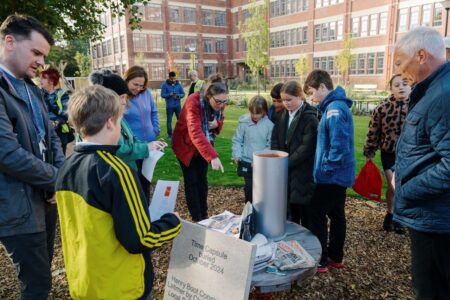Mondelez delivers key updates on its major CFI initiative tackling deforestation

Sour Patch and Oreo went hand in hand on the Mondelez stand at the Sweets & Snacks Expo and are due to link for a special edition line. Pic: Neill Barston
Mondelēz International has released a key update on progress surrounding its contribution to the Cocoa and Forests initiative (CFI) including aims to end deforestation in its primary forest supply chains within the next two years, writes Neill Barston.
The company was a founder signatory of the agreement in 2017 between governments, industry and civil society, joining a total of 36 key stakeholders with a shared goal of significantly reducing sector related environmental impact.
While the scheme has been widely lauded across the sector as a valuable step in the right direction, it has also seen concerns from a industry observers, including organisations such as Mighty Earth, which highlighted the fact that key cocoa sector nations including Ivory Coast and Ghana are still experiencing notable levels of deforestation.
However, Mondelez has asserted that core progress continues to be made in relation to the venture, setting out its achievements in a fresh update.
These include short term goals of all of its Cocoa Life registeredfarms to be mapped in the direct supply chain (which amounts to ~182,000 farms mapped), by 2025.
In terms of forest protection, it has also delivered a total of 500,000 hectares with deforestation risk assessments, as well as 2,35 million multi-purpose trees distributed for on-farm planting via agroforestry
As regards sustainable production, its CFI Phase Two (2022-2025) in Ghana and Ivory Coast has by next year aimed to distribute a total of 2,700,000 cocoa seedling distributed to farmers in Ghana, as well as training 86,000 farmers trained or coached on Good Agricultural Practices (GAPs). In addition, a total of 89,000 individuals reached and participating in Additional Income Generating Activities (IGAs)
According to the company, it has taken a phased approach, aiming for cocoa, palm, soy, and paper materials placed on the market after December 30, 2024 and used by our European business, to be deforestation free – with a goal for other regions to follow by December 31, 2025.
As the company noted, the cutoff date is December 31, 2020 in accordance with EU regulations and SBTi guidance. This is the date after which deforestation is counted in a company’s supply chain, meaning that products have to be produced on land that has not been subject to deforestation or forest degradation after December 31, 2020.
Furthermore, as the business noted in its CFI update, developing a more sustainable, scaled and thriving cocoa supply chain can help us to reduce our total greenhouse gas (GHG) footprint and in turn, work towards our long-term goal to realize net zero CO2e emissions by 2050. Cocoa Life, our signature sustainable sourcing programme, helps to protect and restore forests in cocoa-producing countries. As the company has noted, it has collaborated with partners and governments to help farmers grow more resilient cocoa through agricultural practices.
It has taken on initiatives to coach farmers, map farms and plant trees, and we work with farming communities, peers, sector partners, our external advisory council, and governments to drive solutions on a landscape level.
As the business noted, Cocoa Life farmers are those that are registered with Cocoa Life; they are independent and not employed by MDLZ. Additionally, MDLZ does not own or operate Cocoa Life registered farms. Our ambition is to seek no deforestation on Cocoa Life registered farms. This is how we aim to help make cocoa right.
Cedric Van Cutsem Senior Director Cocoa Life, Mondelēz International, observed that tackling the upcoming EUDR regulations on environmental protection were of significant importance.
Writing in the foreword for the company’s latest CFI progress report, he said: “The EUDR is an important step for the sector as it has been reported that cocoa makes up 7.5% of the EU’s contribution to global deforestation (Bloomberg NEF). As farmers continue to experience poverty, crop losses and environmental change, they may be pushed to expand into new forest areas, triggering a vicious cycle. This marks a pivotal moment for the EU, the global cocoa sector, and the Cocoa & Forests Initiative (CFI) — as well as Cocoa Life.
“Launched by Mondelēz International (MDLZ) in 2012, Cocoa Life’s core ambitions have always been to support farmers’ livelihoods, help address deforestation and secure a more sustainable supply of cocoa. Collaboration has always been at the heart of those efforts.
“When MDLZ helped found the CFI, alongside the governments of Côte d’Ivoire and Ghana and other world-leading chocolate and cocoa companies, it was the first sector-wide public-private cocoa partnership of its kind and represented a ground-breaking ambition to seek to end deforestation and restore forest areas.”
He added that aligning with others for global action was. of key importance, though he acknowledged that the industry was facing ‘big challenges;’ that had resulted in much uncertainty within wider supply chains.
Significantly, he added that despite such tests, the business remained focused on implementing the Cocoa Life program and continuing to deliver on initiatives in collaboration with its partners.



